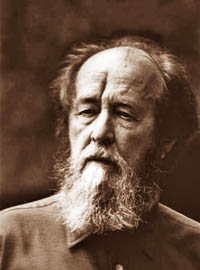Solzhenitsyn: A literary giant
 Russian
writer and dissident Alexander Solzhenitsyn, who shone a light on the
inhuman world of the Soviet gulags, died late Sunday, the Itar-Tass news
agency said, citing his son Stepan. He was 89. Russian
writer and dissident Alexander Solzhenitsyn, who shone a light on the
inhuman world of the Soviet gulags, died late Sunday, the Itar-Tass news
agency said, citing his son Stepan. He was 89.
The Nobel laureate died of heart failure at his Moscow home at 11:45
pm (1945 GMT), the writer’s son said.
Solzhenitsyn won the Nobel Prize for literature in 1970 after writing
harrowing works about the Soviet Union’s system of labour camps, where
he spent eight years from 1945.
Solzhenitsyn toiled obsessively to unearth the darkest secrets of
Stalinist rule and ultimately dealt a crippling blow to the Soviet
Union’s authority.
Born to a single mother in 1918 amid the bloody aftermath of the
Russian Revolution, Solzhenitsyn was initially a loyal Communist.
Yet he went on to undermine the regime’s moral foundations, his
writings energizing dissent at home and in the West.
Recognizable later in life by his flowing beard and ascetic dress,
Solzhenitsyn set himself in the prophetic tradition of Gogol and
Dostoyevsky.
First though he had to enter the living hell of the Gulag, a vast
prison system that stretched from the Solovetsky Islands in the White
Sea to the steppes of Kazakhstan and swallowed up millions of arrested
people on the flimsiest of pretences.
Solzhenitsyn was sentenced to eight years in the camps in 1945 and
was to go on to survive cancer and a KGB assassination attempt.
By Gulag standards, conditions at the camp near Moscow where he
initially worked were relatively tolerable.
But he deliberately exchanged them for back-breaking physical toil in
a camp in Kazakhstan so as to share the lot of ordinary prisoners, a
typical act of self-mortification that almost killed him.
He was released in February 1953, a few weeks before Stalin’s death.
He spent three more years in internal exile in Kazakhstan, contracted
and overcame cancer, before moving back to Russia as a schoolteacher.
Then in 1962 he burst onto the world of literature with “One Day in
the Life of Ivan Denisovich”.
A slim volume published with official approval during the thaw under
Stalin’s successor, Nikita Khrushchev, it described the world of the
forced labour camps.
After its publication in the magazine Novy Mir, two subsequent
editions totalling 850,000 copies sold out immediately.
“Cancer Ward” and “The First Circle” followed, both appearing in
English in 1968.
Amid a crackdown under Khrushchev’s successor Leonid Brezhnev,
Russians for 20 years could read the texts only in clandestine editions.
But already by 1970 Solzhenitsyn’s impact was so great that he was
awarded the Nobel Prize for Literature. He accepted the award but
refused to travel to receive it for fear of not being allowed to return
home.
By now Solzhenitsyn was sacrificing everything to his massive
portrait of the camps, “The Gulag Archipelago,” covertly collecting
information from 227 former prisoners.
The authorities were at a loss to know what to do about him.
In 1970 Solzhenitsyn was sheltered by the cellist Mstislav
Rostropovich, who wrote an open letter to Pravda newspaper supporting
him. Rostropovich, who died in April 2007, was to suffer for their
closeness, eventually being forced into exile.
The next year Solzhenitsyn suffered a bout of “heat stroke” which was
later revealed to have been caused by ricin, a poison administered
surreptitiously in a crowded shop.
Finally the authorities discovered manuscripts for “The Gulag
Archipelago” and in 1974 Solzhenitsyn was expelled by KGB chief Yury
Andropov.
After a spell in Switzerland he moved to a remote village in Vermont,
in the United States, where he devoted himself to his “Red Wheel” cycle,
a fictionalised history of the run-up to the Revolution.
The world now discovered a Solzhenitsyn who was highly critical of
Western ways and called for moral renewal based on Christian values.
His spectacular return to his homeland in 1994 proved something of an
anti-climax. The new Russia was as alien to Solzhenitsyn as the United
States had been, a finding he shared with audiences in gloomy televized
harangues.
In June last year, then Russian president Vladimir Putin awarded
Solzhenitsyn the State Prize, Russia’s highest honour, praising his
devotion to the “fatherland” in a lavish ceremony at the Kremlin.
Solzhenitsyn’s wife Natalya accepted the award on behalf of her
husband, who was unable to attend the ceremony.
Speaking via a video message, Solzhenitsyn said he was “flattered by
the attention to my work brought by this Russian State Prize.”
“Until the end of my life I can hope that the historical material...
collected by me and presented to my readers, enters the consciousness
and memory of my fellow countrymen,” he said.
A complete edition of Solzhenitsyn’s works, including unpublished
writings, began to be published in 2006, with the last volume due out in
2010. His wife said at the time she did not expect her husband to live
to see the last edition. Russia’s President Dmitry Medvedev has sent the
family his condolences.
AFP |

